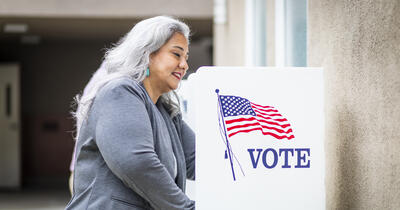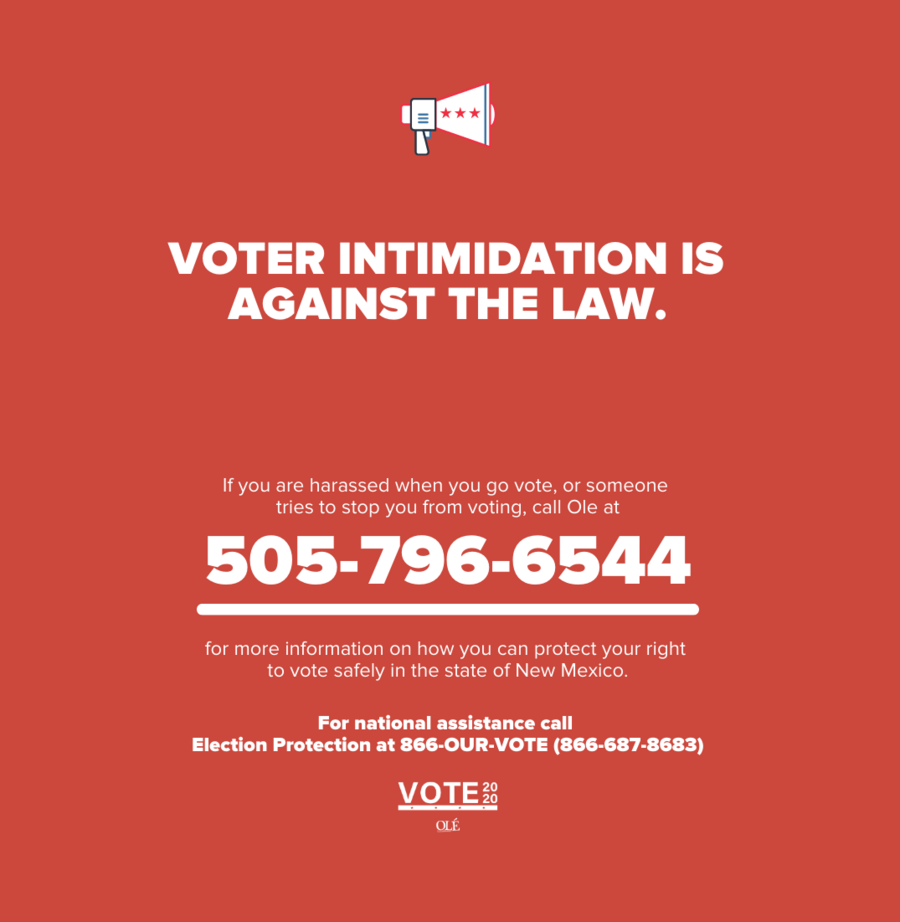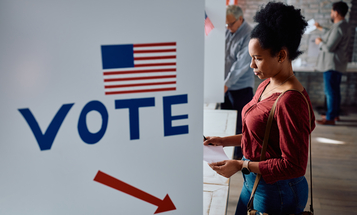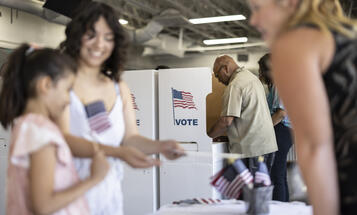
Addressing Voter Intimidation and Building Power: A Conversation with OLÉ New Mexico
Andrea Serrano and Miles Tokunow of OLÉ (Organizers in the Land of Enchantment) on their efforts to combat white supremacist voter intimidation and build power for working people and people of color in New Mexico.

Black and brown communities are facing heightened assaults this year on their right to vote. We spoke with Andrea Serrano, Executive Director of OLÉ (Organizers in the Land of Enchantment), and Miles Tokunow, Deputy Director of OLÉ, about their efforts to combat white supremacist voter intimidation and build power. This interview has been condensed and edited for clarity and length.
Laura Williamson: I'd love to start with what I understand is an important question in New Mexico. Red chili or green chili—where do you land?
Miles Tokunow: I think this is our state question, actually.
Andrea Serrano: It is. I'm going to say red. I love green chili, and for the uninitiated in New Mexico, green chili is a really big deal for us. The smell of chili roasting is like the mark of fall, and it's the most amazing smell in the world. Green chili, though, isn't forgiving. If it's hot, your ears burn. But if your red chili didn't come out hot enough the first time, you can add more and make it hotter. So, I lean more toward red chili.
Miles: And I'll be green, because I want that punishment of the heat. But it depends on the place, too, so I'll ask, which is hotter? And then I'll take that one.
Laura: Now I have even more questions about chili, but we'll save those for later. For now, tell us about OLÉ and your work.
Andrea: We’re a membership-based organization, and our work is driven by members who come from lots of different walks of life, and we center the experiences of working people and people of color. Our work is rooted in four areas. First, worker rights, everything from raising wages to paid sick leave, to hazard pay. With the pandemic, this has been a topic that our members are really focused on. We also focus on early education for all. Our newest program is democracy reform, everything from voting rights to re-enfranchisement. And our fourth program is citizenship. We work with permanent residents who are ready to become citizens, and support folks when they are getting ready to take their exam.
Laura: New Mexico has been mostly a blue state for decades. And the population is nearly 50 percent Hispanic and 11 percent Native American. Why is voter suppression and white supremacy an issue in New Mexico?
One of the reasons OLÉ entered into democracy reform is because in some ways, neither party is listening to us.
Miles: One of the reasons OLÉ entered into democracy reform is because in some ways, neither party is listening to us. We continue to be left out of elections and civic engagement and the democratic process. One of the big elements we’re working on is getting rid of big money influence in our local elections. To quote Wu-Tang, “C.R.E.A.M.,” Cash Rules Everything Around Me. We see our policies being shaped by people who are listening to corporations instead of listening to the people. It’s a vicious cycle, and a lot of our work is to change and break that cycle.
There's also a misconception that when you're a people-of-color majority state, there's magically no racism or white supremacy.
Andrea: There's also a misconception that when you're a people-of-color majority state, there's magically no racism or white supremacy. There's a long history of white supremacy playing out in this region, first with the Spanish in the 1500s, all the way through when the U.S. took over, through the Mexican-American War, and then into statehood.
Despite all of that, we're still here. We are facing our history and breaking through the myth that we're a tri-cultural state of Hispanic, Native American, and Anglo. We are recognizing that Black and Asian and Pacific Islander communities have a very long history in New Mexico.
We talk about rebuilding our democracy, and the reality is, democracy was never set up for people like me or Miles, it wasn't set up for indigenous folks or Asian folks. Or for women. Now, instead, we're looking at how to build our democracy that's for all of us, for the first time.
Laura: This summer, communities of color hit the streets to protest racial violence against Black people. In New Mexico, armed white supremacist militia groups infiltrated protests and perpetrated further violence against protesters. Tell us how the presence of such groups impacts your communities and how it might impact voter turnout.
These armed militias, they're domestic terrorists, let's call them what they are.
Andrea: These armed militias, they're domestic terrorists, let's call them what they are. There are reports of some Albuquerque police officers working with them. And we have a president calling on groups like the Proud Boys to show up at the polls, to “stand back and stand by.”
Our communities are preparing for this because there's more of us than them. We are ready to defend our rights. This idea of staying away from voting or staying away from the polls because you're afraid of armed militia, that's exactly what they want, and that's what we have to stand up against.
All of it is just distracting from what needs to be done. The reality is, our families are still poor, and folks are still dying from this pandemic. There's no safety net and folks still have to work, to take their kids to daycare. And now early educators are being infected with COVID. And all these armed militias do is distract us.
Laura: Throughout New Mexico's history, communities of color have resisted voter suppression. How are OLÉ and partners fighting back and keeping voters safe this year?
Andrea: We're opening up our office line as a hotline, we're working with partners to make sure people know there's a place to call if something is happening that doesn't seem right at a polling location. We’re going to have to keep that up, and think about how we codify these protections, how we make them a habit and practice, so we don't have to be afraid all the time when it comes to voting.
Miles: We’re addressing fears through some of the things we’ve always done, like voter education parties. But, for the first time, in collaboration with y'all, we had a beautiful and well-attended conversation about voter suppression in New Mexico, as well as training on knowing your rights at the polls. Also, the white supremacist and militia groups stuff is instilling trauma and re-aggravating trauma in folks. And so, the work we're doing is also trauma responses, it’s being able to quell some of the freeze and flee instincts that a lot of our community are going through.
Laura: This election is critical, but it's not going to save us by itself. There will still be work to do, whatever happens after November. So, once we get through this election and your people are safe, what will OLÉ turn its attention to next?
Well, we’ll take the day off and then we'll get right back to it.
Andrea: Well, we’ll take the day off and then we'll get right back to it. It really is about worker justice, and so passing paid sick leave for all workers is one of our top priorities. And making sure that all workers are protected by fighting for things like hazard pay. Also, ensuring that early educators are being paid professional wages. Many of them are women of color, many of them are immigrants, and they're making minimum wage. And there's the pieces around elections and having a paid legislature, so more people from the community can run for office and serve.
You have the ongoing organizing work that happens every single day, year-round, and then you have these electoral and legislative cycles. We’ll continue finding the way to make sure that we're not just caught up in this moment of the election or this moment of the legislative session, but that we are also building long-term power.
Laura: What is the first thing that you're going do post-Election Day, to unwind and take care of yourselves?
Miles: I'm a big fan of being with water. The first thing I did the day after the 2016 election was take a walk through the Bosque along the river, along the Rio Grande. I'm probably going to do the same thing this year.
Andrea: The day after the election in 2016, I sat on the recliner with a quilt pulled up to my eyes and watched Jane the Virgin all day. I’m hoping that this time around will not be that way! But the way I usually deal with it is cooking, watching a bunch of TV. I think it's about making sure we are able to sustain ourselves in this work. Whether it's walking through the Bosque or hanging out with your dog and your cats, and cooking and watching TV. It’s about being mindful of rest and resting.
Miles: That’s it, finding the sustaining pieces. For OLÉ, the sustaining pieces are our members and the continued brilliance, dedication, resilience that we witness every day. That's how and why we fight so dang hard all together.
Laura: We at Demos are so grateful to be in this fight with you. Thanks to both of you for your time and perspectives on protecting voters this year and building a durable, inclusive democracy beyond this election.





